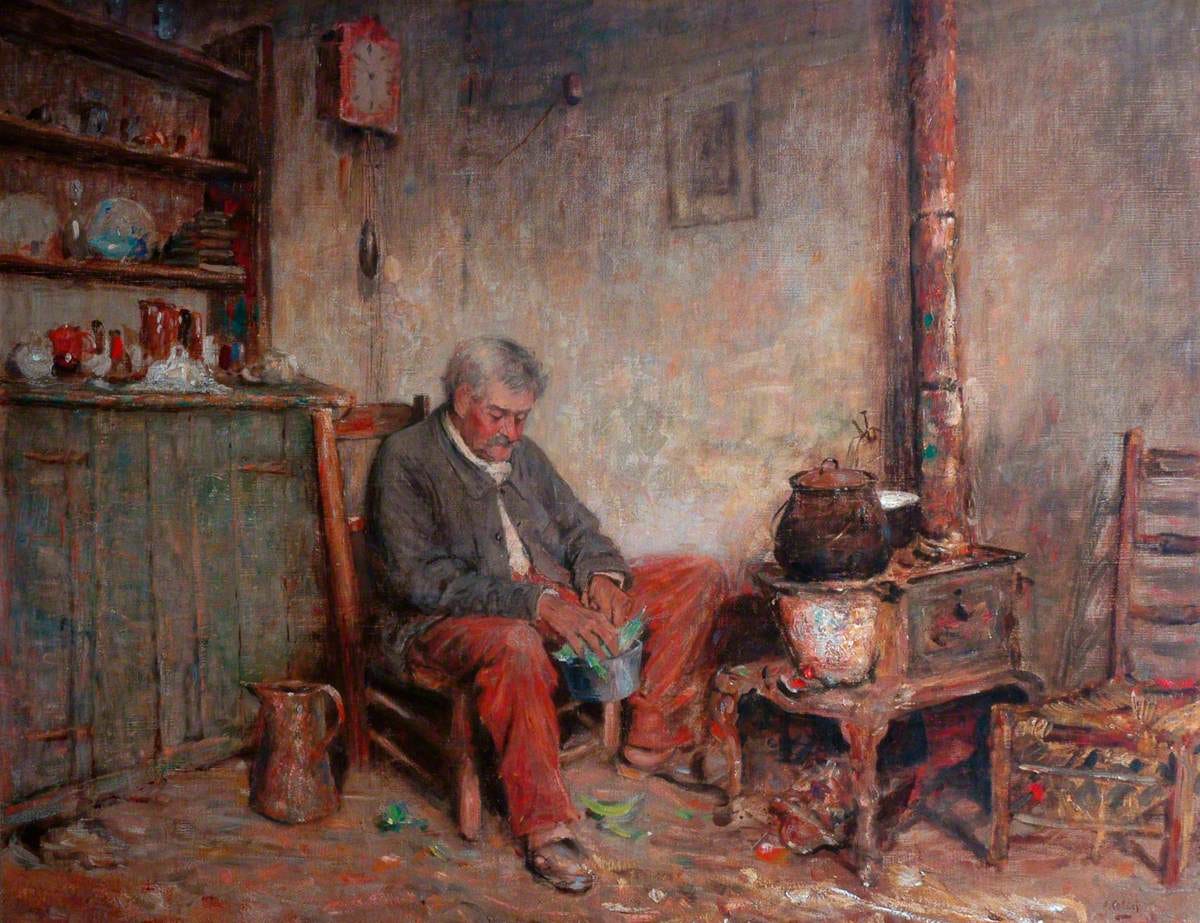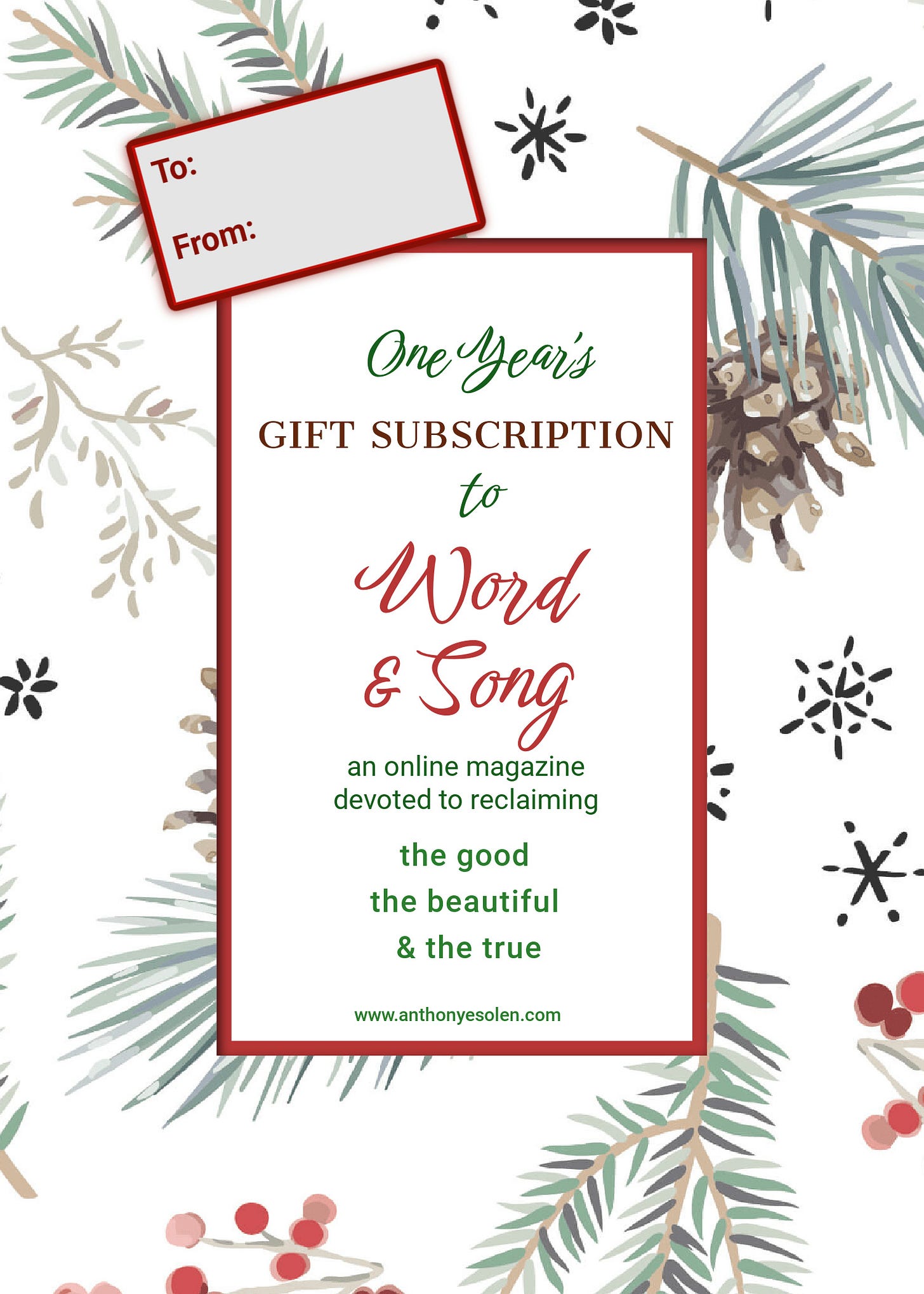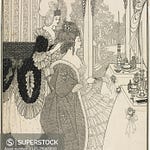Christmastide is here, and so are our Christmas offers at Word & Song!
(Paid subscribers see the very bottom of this page for a bonus offer.)
One day a long time ago, the president of the United States got a letter from his son, who was a prep school student at Groton. He’d met a young fellow who wrote poetry and who was looking for a job, and he’d read some of the man’s poems and thought they were very good. So he sent them to his father the president, to see what he thought of them, and to see if he could find the poet some work to support himself. The president agreed, and the young man was on his way. The boy was Kermit Roosevelt, the president was his father Theodore, and the young poet was ours today, Edwin Arlington Robinson.
I’m very fond of this sad and sweet drama, “Mr. Flood’s Party,” which I first read when I myself was Kermit’s age, in high school. Poor Mr. Flood – Eben Flood, with a pun on both names, because the tide of life ebbs and floods – has survived all his friends, and so he goes out on New Year’s Eve to have his own little party, with the jug of hooch he has brewed for himself. He stands alone on a hilltop overlooking the town below, where he doesn’t know anyone anymore, and he sets the jug tenderly down, knowing “that most things break,” and that the lives of men assuredly do not stand on firm ground. We really must picture the whole scene to get the humorous drama of it, a humor that escapes being sentimental, and yet that can break your heart. He has set the jug down so that he may take a step back and welcome his guest with all conviviality: his guest is Mr. Flood himself! He wants to shake his own hand, to welcome himself, not because he’s selfish, but because he’s lonely, and it’s no good drinking by yourself, as everyone knows. Pay close attention to the details, such as this one: Mr. Flood sings “Auld Lang Syne,” to nobody, and in a way that’s comforting to him, because if anyone were to hear him, it would be with suspicion and surliness, and the only creature there listening are the “two moons.” Why two? Well, what might cause you to see double? I know of two things. One of them is the hooch. The other is what Robinson does not need to mention.
Old Eben Flood, climbing alone one night
Over the hill between the town below
And the forsaken upland hermitage
That held as much as he should ever know
On earth again of home, paused warily.
The road was his with not a native near;
And Eben, having leisure, said aloud,
For no man else in Tilbury Town to hear:
"Well, Mr. Flood, we have the harvest moon
Again, and we may not have many more;
The bird is on the wing, the poet says,
And you and I have said it here before.
Drink to the bird." He raised up to the light
The jug that he had gone so far to fill,
And answered huskily: "Well, Mr. Flood,
Since you propose it, I believe I will."
Alone, as if enduring to the end
A valiant armor of scarred hopes outworn,
He stood there in the middle of the road
Like Roland's ghost winding a silent horn.
Below him, in the town among the trees,
Where friends of other days had honored him,
A phantom salutation of the dead
Rang thinly till old Eben's eyes were dim.
Then, as a mother lays her sleeping child
Down tenderly, fearing it may awake,
He set the jug down slowly at his feet
With trembling care, knowing that most things break;
And only when assured that on firm earth
It stood, as the uncertain lives of men
Assuredly did not, he paced away,
And with his hand extended paused again:
"Well, Mr. Flood, we have not met like this
In a long time; and many a change has come
To both of us, I fear, since last it was
We had a drop together. Welcome home!"
Convivially returning with himself,
Again he raised the jug up to the light;
And with an acquiescent quaver said:
"Well, Mr. Flood, if you insist, I might.
"Only a very little, Mr. Flood—
For auld lang syne. No more, sir; that will do."
So, for the time, apparently it did,
And Eben evidently thought so too;
For soon amid the silver loneliness
Of night he lifted up his voice and sang,
Secure, with only two moons listening,
Until the whole harmonious landscape rang—
"For auld lang syne." The weary throat gave out,
The last word wavered; and the song being done,
He raised again the jug regretfully
And shook his head, and was again alone.
There was not much that was ahead of him,
And there was nothing in the town below—
Where strangers would have shut the many doors
That many friends had opened long ago.
A printable gift certificate is available below for your use!
Word & Song by Anthony Esolen is an online magazine devoted to reclaiming the good, the beautiful, and the true. We publish six essays each week, on words, classic hymns, poems, films, and popular songs, as well a weekly podcast for paid subscribers, alternately Poetry Aloud or Anthony Esolen Speaks. Paid subscribers also receive audio-enhanced posts and on-demand access to our full archive, and may add their comments to our posts and discussions. To support this project, please join us as a free or paid subscriber. We value all of our subscribers, and we thank you for reading Word and Song!
Subscribed
Listen to this episode with a 7-day free trial
Subscribe to Word & Song by Anthony Esolen to listen to this post and get 7 days of free access to the full post archives.















